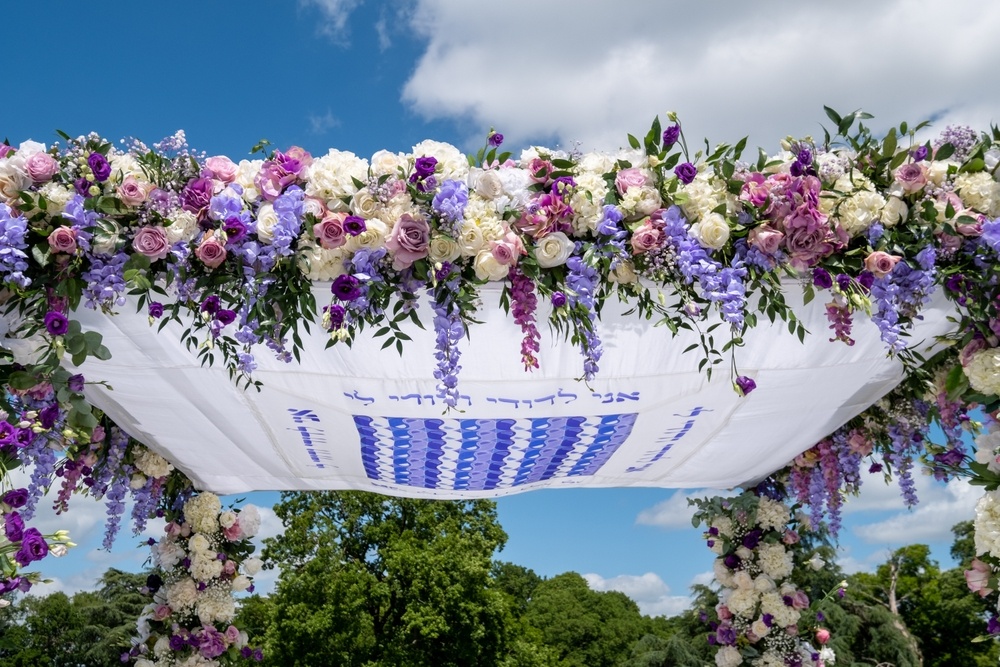
As we discussed in our last post, mourning and Yom Tov[1] are polar opposites, and mourning has no place on these days of joy. Such is readily understandable. What is less understandable is the following Mishnah.
“We do not marry on the holiday, neither virgins, nor widows, nor a levirite marriage, because there is great joy for him [and her]” (Moed Katan 8b). At first glance, this makes little sense. The joy of a wedding should be a reason to get married specifically on Chol Hamoed, not a reason to avoid such. Why the prohibition of getting married on the festival? To this, the Gemara gives up series of responses, some complementary, some contradictory.
“We do not mix one simcha with another”. It is precisely because marriage and the celebration of our festivals are great times of joy that we may not combine them. Each deserves its own time and full attention. Just as we may not marry off two children on the same day--each child deserves a unique day--Yom Tov and marriage require separate times to celebrate[2].
The Gemara then quotes the view of Rava, the son of Rav Huna, who is fearful that one might “abandon the simcha of the festival and involve himself with his wife”. This is then followed with Rav's biblical source for this prohibition: “v'samachta bechagecha, you shall rejoice in your holiday--but not with your [new] wife”. These three explanations are, it seems, really one. We must celebrate each joyous occasion separately, because we are likely to neglect one; and this is actually a biblical command.
However, there may be a subtle dispute here. "We do not mix one simcha with another" is a blanket (rabbinic) prohibition, applying to any and all occasions to rejoice. However, if one bases the prohibition on the biblical verse “you shall rejoice in your holidays--but not with your new wife," then this is a specific prohibition which applies only to marriage on a festival. If so, perhaps the explanation is as follows. A man and a women joining together in marriage is the most intimate of acts. An integral part of the wedding ceremony is yichud, where husband and wife are secluded in their private quarters. During the first year of marriage, the couple must solidify their personal relationship, and they are relieved of many communal responsibilities. They are to focus on building their own home.
Yom Tov, on the other hand, is a very public celebration as we commemorate our shared history. We are bidden to leave our home and travel to Jerusalem and join in public celebrations. Most telling is the fact that the mitzvah of aliya leregel is mandatory for men only--allowing, in theory, the family to be separated for Yom Tov. The simcha of marriage and Yom Tov are two very different types of joy.
Ulla then offers a very different reason. Making a wedding involves lots of hard work and, especially in pre-modern times, very little could be prepared in advance. The halacha forbids cooking on Yom Tov those foods that could reasonably have been cooked beforehand, as we do not want people spending Yom Tov in the kitchen. In a similar vein, we do want people spending the holiday on last-minute preparations for a wedding. A wedding on Chol Hamoed would be great--it's just getting there that is problematic.
The last reason given by the Gemara is the most intriguing. “Because of nullification [of the command to be] fruitful and multiply”. In theory, there is no better time for a wedding than Chol Hamoed. And it is precisely because it is such a good time for a wedding that they are disallowed. Our Sages were afraid that, instead of getting married soon after one’s engagement, people would actually delay their weddings until Chol Hamoed a few months down the road[3].
Such delays were not necessarily for religious reasons, to join together the holiness of marriage with the holiness of Yom Tov. Much more pragmatic concerns were at work here, namely, saving money. By getting married on Chol Hamoed, when we are already obligated to eat meat and drink wine, we would need to prepare only one meal for both Yom Tov and the wedding. While this may seem foreign to many of us, that is only because we are blessed to be living in the wealthiest generation in history.
It was this desire, or shall we say, need, to save money that explains the custom of many in medieval Europe to get married on Friday afternoon, combining the Shabbat and wedding meal into one. In case you are wondering because a Friday night wedding means no music, no need to worry. The Shulchan Aruch (Orach Chaim 338:2) rules that it is permissible to hire non-Jews to play musical instruments on Shabbat for such an occasion--with the Ramah in his glosses adding that this was the common practice. While this may seem radical to many today, it is actually a straightforward application of a basic principle of Jewish law. For the sake of a mitzvah, one may ask a non-Jew to violate a rabbinic prohibition. And playing musical instruments on Shabbat is “only” a violation of rabbinic law.
It is the notion that we should not mix smachot that is quoted in the codes of Jewish law. This is in marked contrast to mourning, where we combine tragedies into one day. Tisha B'av is the day we mourn not only the destruction of the Temple, but the Crusades, the burning of much rabbinic literature in Paris in 1240, the Holocaust--all tragedies that have nothing to do with the date of Tisha B’av. While we combine tragedy, we must give each time of joy its own special day, thereby multiplying days of joy in our calendar. It is through joy that we are to worship G-d.
[1] I use the terms Yom Tov and Chol Hamoed interchangeably--the mitzvah of simach applies throughout the festival.
[2] Most telling, the Shulchan Aruch (Even Haezer, 62:2) allows celebrating multiple weddings together if they involve the poor and the wealthy, thereby allowing the poor to celebrate in dignity and without shame.
[3] Implicit in this passage is prohibiting birth control. Being that, in reality, no such prohibition exists, it is not surprising that this reason is not accepted. Truth be told, one could argue today that for many young couples, it is only the ability to use birth control that allows them to get married while still in school.



